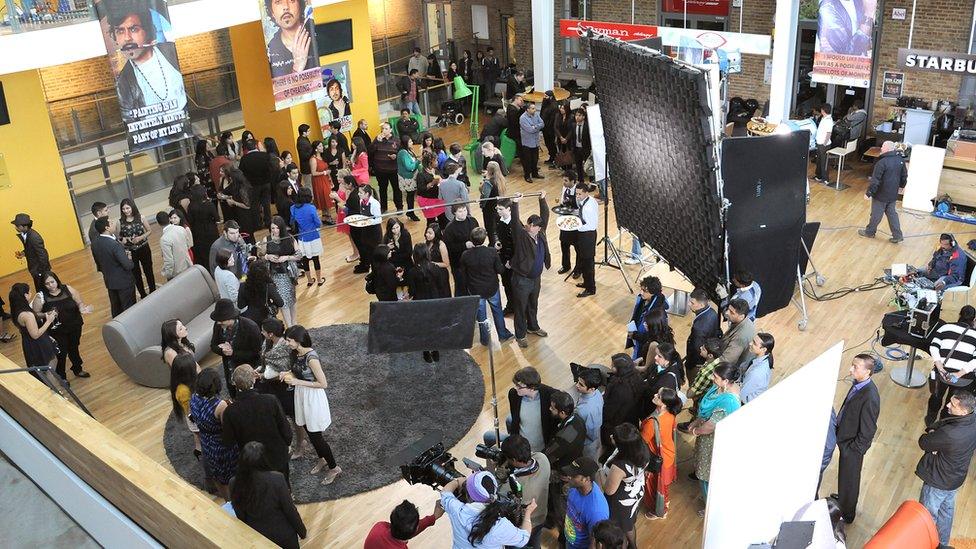Do students pick universities because of movies?
- Published

Legally Blonde star Reese Witherspoon: Are movies the way for universities to reach a wider audience?
Are movies a hidden factor in choosing a university? Does Hollywood and Bollywood influence where students want to study?
Instead of prospectuses and stalls at international recruitment fairs, should universities try to attract overseas students through the cinema?
Instead of focusing on international university rankings, should they be looking at box office takings?
Sir Anthony Seldon, vice chancellor of Buckingham University and former headmaster of Wellington College, says: "Television and film portrayals of schools and universities are far more important in opinion formation I think than generally realised."
This is supported by a recent survey of Chinese and South Korean students in the United States, by Dr Kristy Tucciarone of Lindenwood University, Missouri, which suggested that more than two thirds of those interviewed had been influenced by the movie image of going to an American university.
The US is the world's biggest destination for overseas students and it brings an estimated $20bn (£14bn) each year to the economy.
Movies such as A Beautiful Mind set in Princeton, Legally Blonde and The Social Network in Harvard, and The Graduate in Berkeley, California, have taken the US campus experience to a global audience, showcasing everything from the academic facilities to wild fraternity parties.

The University of Leicester has hosted the filming of Bollywood movies, raising the university's profile with students in Asia
A student in the survey reflected on how lecturers seemed to respect their students and students in the US had the "freedom to ask any questions to the professor" - based on the evidence of watching movies.
In the UK, the University of Leicester has made itself "open to business" to Bollywood, hosting three films since 2001. Part of the deal struck with the 2013 film Yamla Pagla Deewana 2 was that the lead actor would say on screen that he graduated from Leicester.
University spokesman Ather Mirza says the Bollywood connection gives Leicester an advantage in a crowded marketplace.
"Everyone is shouting and it's not about who shouts loudest, but who has something distinctive to say," he says.
"This has helped to create a narrative for the university and definitely raised awareness of us in India."
Mr Mirza says that whenever a film is shot in Leicester, or shown on TV, there is a flurry of mentions of the university on social media.

How much did Hogwarts sell boarding schools and Latin lessons?
Universities in New Zeland have benefited from The Lord of the Rings effect.
Dr Alfio Leotta, an academic at Victoria University of Wellington, says the movies have encouraged the growth of film studies in New Zealand.
"There has been a lot of critical interest in both Lord of the Rings and The Hobbit and one of the consequences is that students now regard New Zealand, and Wellington in particular, as a place that can produce major blockbusters."
Film can also be used to change negative perceptions of a person or place.
In 2009 there were high profile protests in both Australia and India after a series of violent attacks on Indian students in Australia.
This was followed by a very sharp decline in Indian students choosing Australian universities, which was a serious problem in such an important student market.

Lord of the Rings movies brought film students to New Zealand
So Prateek Chakravorty, a Bollywood director and alumnus of University of Technology Sydney, made From Sydney With Love about an Indian student at University of New South Wales.
"I studied at UTS, and for me the experience was very good, so I made a film about it," said Mr Chakravorty.
The film, which opened in 900 cinemas in India, showed two students falling in love to the backdrop of the Sydney university buildings, Bondi Beach and the opera house.
By 2014 the numbers of Indian students in Australia were rising again.
Policies on visas and scholarships might have been largely responsible, but Aleksandr Voninski, international director at University of New South Wales, gives From Sydney With Love and another movie (Un)Indian some of the credit.
"While is impossible to accurately pinpoint and track what impact the movies have had, we believe they have positively influenced prospective students and parents," said Mr Voninski.

A more positive movie message helped improve the dented image of Sydney for overseas students
The global success of the Harry Potter films has been claimed as a factor in encouraging overseas students to come to British boarding schools.
But it has also been credited with rescuing Latin.
After Latin was reintroduced to Bromley High School GDST in 2002, the subject became so popular that it was offered to pupils taking GCSEs and A-levels.
Lorna Duggleby, the school's former head teacher, says the Potter franchise partly fuelled this demand.
"I often got comments about Harry Potter and the connection between Latin and the names of spells," she says.

More stories from the BBC's Global education series, external looking at education from an international perspective and how to get in touch

There are also risks associated with appearing in films.
University administrators can be stereotyped as unreasonable and pedantic - the Will Ferrell comedy Old School is one of many about students fighting an unsympathetic dean.
Legally Blonde, a comedy about a young woman overcoming other people's stereotypes to succeed in law school, is now associated with Harvard. The popularity of the movie has put the university's name in front of audiences around the world.
But it could have been set in Stanford's law school - where the original novel was set - or Chicago, but both turned it down.
It's not hard to see how universities might have hesitated about a story with campus snobbery and an academic making advances on a student.
Television and film have even been linked to mistakes made by students.
An audit into trainee doctors in Canada several years ago found many were making the same mistake in one particular piece of surgery.
An investigation found many claimed to have been influenced by medical dramas - and further inquiries showed that the same procedure had been shown 26 times in the medical drama ER, with none depicting the approved technique.
But the case of the University of Leicester shows how movies can be used to help recruit international students.
When universities are competing hard for the attention of overseas students, the cinema screen could be an under-recognised way of raising a global profile.